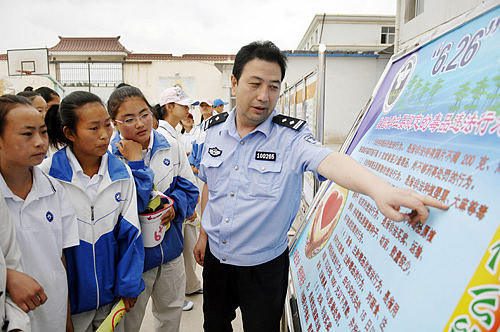|
 |
|
VITAL INFORMATION: A police officer explains the harmful effects of drug use to students at Baohu Middle School in Yinchuan, Ningxia Hui Autonomous Region, on International Day Against Drug Abuse and Illicit Trafficking on June 26 (PENG ZHAOZHI) |
Multi-Party Cooperation
Unlike in other political systems, the eight non-communist parties in China are not opposition parties, but rather participants in the administration of state affairs, said a senior official of the Communist Party of China (CPC) on June 29.
Zhang Xiansheng, a spokesman for the United Front Work Department of the CPC Central Committee, said at a press conference these parties are friends of the CPC.
According to Zhang, these parties have approximately 840,000 members, compared to around 10,000 in 1949 and more than 60,000 in the late 1970s.
The country's current political system of multi-party cooperation has "wide coverage," Zhang said, adding "besides the existing parties, it is unnecessary to establish new parties," as the nine have basically covered all circles.
Panda Census
China has started its once-a-decade census of endangered giant pandas, according to forestry authorities in southwest Sichuan Province, a vital habitat of the rare species.
The census, the fourth since it was first launched in the 1970s, began on June 26 with a pilot survey in the Wanglang National Reserve in Mianyang City. The reserve is believed to have the largest number of wild pandas in the country.
The pilot survey was expected to end by early July, and then the nationwide census would start, said a forestry official in Sichuan.
Census takers will collect panda droppings for DNA analysis, which will allow zoologists to track individual pandas and accurately estimate the number of pandas living in the wild.
The census will ascertain not only the number of wild pandas but also their living conditions, age structure and change of habitat.
The previous census 10 years ago counted 1,596 wild pandas in China with 1,206 of them living in Sichuan, including 230 in the Wanglang Reserve and its nearby regions.
Fiscal Transparency
Minister of Finance Xie Xuren said on June 27 all of China's 98 central government departments would unveil their budgets for this year, which would include expenditures for overseas travels, receptions and official cars.
Last year's related expenditures should also be publicized, Xie said in a report to the Standing Committee of the National People's Congress, the country's top legislature, during its bimonthly lawmaking session.
Upon receiving approval from the legislature, the Ministry of Finance would publicize the central government's total administrative expenses as well as expenditures for overseas travels, receptions and official cars, Xie said.
Expenditures on these three items have long been criticized as sources of government corruption and waste.
Drug Rehabilitation
China's new regulations on drug rehabilitation took effect on June 26, encouraging drug users to voluntarily undergo rehabilitation programs.
Drug users who voluntarily receive intervention programs "will be exempt from punishment," said the regulation, which supplements the country's anti-drug laws implemented three years ago.
With seven chapters and 46 articles, it also stipulates the rights and obligations of drug addicts, as well as supporting measures for voluntary, community-based and government-ordered drug rehabilitation.
To date, more than 2 million Chinese have received compulsory rehabilitation or treatment.
The regulation also stipulates the protection of drug addicts' personal information, saying "members of the police, judiciary and health departments who leak personal information must be punished." | 